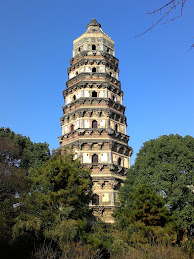今天查了權威的 The Oxford English Dictionary《牛津英語詞典》第二版,它對 -ese 來龍去脈所做的解釋,應該是所有工具書裡最詳盡、最值得信賴的了。我原文照登,括弧裡附上自己的翻譯和註釋:
-ese, suffix
forming adjs., is ad. OF. -eis (mod.F. -ois, -ais):—Com. Romanic -ese (It. -ese, Pr., Sp. -es, Pg. -ez):—L. ēnsem [以上解釋 -ese 的詞源:用以構成形容詞,改寫自古法語的 -eis,現代法語拼為 -ois 或 -ais,羅曼語族 (即 "拉丁語族") 有類似的拼法,如義大利語的 -ese、普羅旺斯語、西班牙語的 -es、葡萄牙語的 -ez,最終來自拉丁文的 ēnsem].
The L. suffix had the sense 'belonging to, originating in (a place)', as in hortēnsis, prātēnsis, f. hortus garden, prātum meadow [在拉丁文裡,這個後綴 (即 "字尾") 意為 "屬於 (某地) 的、源自 (某地) 的",並舉 "花園"、"草地" 二詞為證], and in many adjs. f. local names, as Carthāginiēnsis Carthaginian, Athēniēnsis Athenian [還用以構成眾多地名的形容詞,並舉 "迦太基"、"雅典" 為例].
Its representatives in the Romanic langs. are still the ordinary means of forming adjs. upon names of countries or places [在羅曼語族裡,這個後綴還是用以構成國名、地名形容詞的常規手段].
In Eng. -ese forms derivatives from names of countries (chiefly after Romanic prototypes), as Chinese, Portuguese, Japanese, and from some names of foreign (never English) towns, as Milanese, Viennese, Pekinese, Cantonese [英文裡的 -ese 主要仿照羅曼語言的原型,用以構成國名及外國城市名的衍生詞,並舉 "中國"、"葡萄牙"、"日本",以及 "米蘭"、"維也納"、"北京"、"廣州" 為例].
These adjs. may usually be employed as ns., either as names of languages, or as designations of persons [這些由國名、城市名衍生出來的形容詞,通常亦可當名詞用,作為語言名或住民名]; in the latter use they formerly had plurals in -s, but the pl. has now the same form as the sing., the words being taken rather as adjs. used absol. than as proper ns [-ese 住民名的複數原先要加 -s,現在單複數同形;這些住民名多以獨立形容詞來使用 (即省略其後修飾的名詞),而不作為專有名詞].
(From words in -ese used as pl. have arisen in illiterate speech such sing. forms as Chinee, Maltee, Portugee [有人誤以為 -ese 是複數,因此類推產生了以 -ee 結尾的這種不規範的單數形式,舉 "中國人"、"馬爾他人"、"葡萄牙人" 為例].)
A frequent mod. application of the suffix is to form words designating the diction of certain authors who are accused of writing in a dialect of their own invention; e.g. Johnsonese, Carlylese [這個 -ese 現在也常被加在某些作家名之後,用來表達對他們自創語言風格的不滿,舉 "約翰遜用語"、"卡萊爾用語" 為例].
On the model of derivatives from authors' names were formed Americanese, cablese, headlinese, journalese, newspaperese, novelese, officialese, etc [對其他語言風格的不滿亦可藉由此法構成,如 "美國用語"、"電報用語"、"標題用語"、"新聞用語"、"報紙用語"、"小說用語"、"官方用語" 等].
1898 F. Harrison in 19th Cent. June 941 As Mat Arnold said to me.. 'Flee Carlylese as the very devil!' Yes! flee Carlylese, Ruskinese, Meredithese, and every other ese. 1899 Golf Illustr. 14 July 134 American 'golfese'. 1906 Daily Chron. 2 Aug. 3/2 Deplorable guide-bookese. 1935 E. E. Cummings Let. 11 Mar. (1969) 140 Am fighting‥to retranslate 71 poems out of typewriter language into linotype-ese. 1951 Amer. Speech XXVI. 172 (heading) Washingtonese. [書證部分,請自行參閱]
這個 -ese 真有歧視的味道嗎?證據在前,我還是沒有改變我 4 年前的看法。
Subscribe to:
Post Comments (Atom)


No comments:
Post a Comment